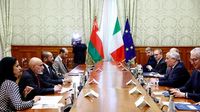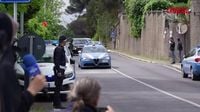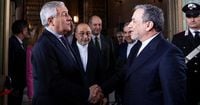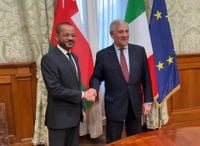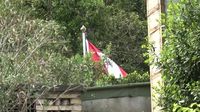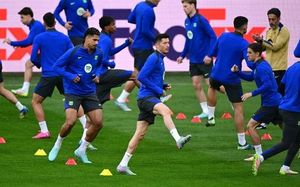On April 19, 2025, Rome became the focal point of international diplomacy as it hosted indirect negotiations between the United States and Iran regarding Iran's nuclear program. These talks, mediated by Oman, are seen as a critical step in addressing ongoing tensions surrounding Iran's nuclear ambitions.
The Italian Foreign Minister and Deputy Prime Minister, Antonio Tajani, welcomed Iranian Foreign Minister Abbas Araghchi at 9:45 AM, followed by a meeting with Rafael Grossi, the Director General of the International Atomic Energy Agency (IAEA), just an hour later. "Italy is ready to support any further initiative in favor of peace and international stability," Tajani stated, emphasizing the importance of multilateral cooperation.
The summit took place at the Omani Embassy in Rome, with the presence of U.S. Special Envoy for West Asia, Steve Witkoff, and Omani Foreign Minister Badr al-Busaidi, who played a pivotal role in facilitating dialogue between Tehran and Washington. Oman had strongly advocated for Italy as the location for these discussions, describing it as a "neutral European nation attentive to dialogue," according to Iranian Foreign Ministry spokesperson Esmail Baghaei.
Araghchi's arrival in Rome marked a significant moment in a series of diplomatic engagements that had previously seen him meet with Russian President Vladimir Putin in Moscow and then head to Beijing. This triangulation of diplomacy underscores Rome's emerging role as a central hub in global negotiations.
In his remarks, Baghaei reiterated Iran's commitment to diplomatic solutions, stating, "Iran has always chosen the diplomatic path with a sense of responsibility and good faith." He highlighted the need for sincere dialogue among nations, arguing that "lasting peace arises from sincere dialogue between nations, not from the imposition of force."
Rafael Grossi, who had met with Araghchi in Tehran days earlier, characterized their discussions as "productive." He stressed the necessity of Iran's cooperation with the IAEA to provide credible assurances regarding the peaceful nature of its nuclear program. "The cooperation of Iran with the Agency is indispensable for providing credible guarantees regarding the peaceful nature of its nuclear program," Grossi remarked.
However, the backdrop of these talks is fraught with complexity. Reports from the New York Times indicated that President Donald Trump recently halted a planned Israeli attack on Iranian nuclear sites, opting instead to pursue diplomatic avenues. This decision underscores the precarious balance of power in the region and the potential for these negotiations to alter the trajectory of U.S.-Iran relations.
During the previous round of talks held in Muscat, Iran presented a three-phase plan aimed at gradually reducing nuclear tensions in exchange for the lifting of sanctions and access to frozen assets. This proposal, according to sources cited by Iran International, reflects Tehran's willingness to engage in a constructive dialogue, albeit under strict conditions.
As the discussions unfolded in Rome, Israeli officials were reportedly considering military options against Iranian nuclear infrastructure, hoping for U.S. support. Yet, the White House's recent stance suggests a preference for dialogue over military action, a shift that could impact the dynamics of the negotiations.
In a meeting with Tajani, Araghchi asserted that "Israel represents the only obstacle to achieving a Middle East free of nuclear weapons," urging European nations and the international community to adopt a responsible stance free from imposed stereotypes. This sentiment was echoed by Tajani, who expressed Italy's commitment to facilitating a successful dialogue.
As the negotiations continued, Grossi highlighted Italy's constructive role in fostering peace, stating on social media, "I welcome the constructive and increasingly relevant role of Italy in support of peace at a critical time when diplomacy is greatly needed."
The Iranian delegation's arrival in Rome at night marked the beginning of what many hope will be a fruitful round of talks. The Italian government has positioned itself as a mediator, recognizing the importance of dialogue in a world rife with conflict.
On the ground, the humanitarian situation remains dire, with ongoing violence in Gaza resulting in significant casualties. Reports indicate that at least 70 people have died in recent Israeli attacks, further complicating the regional landscape and underscoring the urgent need for diplomatic resolutions.
As the world watches these developments, the stakes are high. The negotiations in Rome are not just about Iran's nuclear program but also about broader geopolitical stability in the Middle East. The outcome of these talks could have far-reaching implications for international relations and security.
In the coming days, the diplomatic efforts will continue, with hopes that a logical and rational agreement can be reached that respects the legitimate rights of Iran while addressing the concerns of the international community. The role of Italy as a mediator could prove pivotal in shaping the future of these negotiations.
